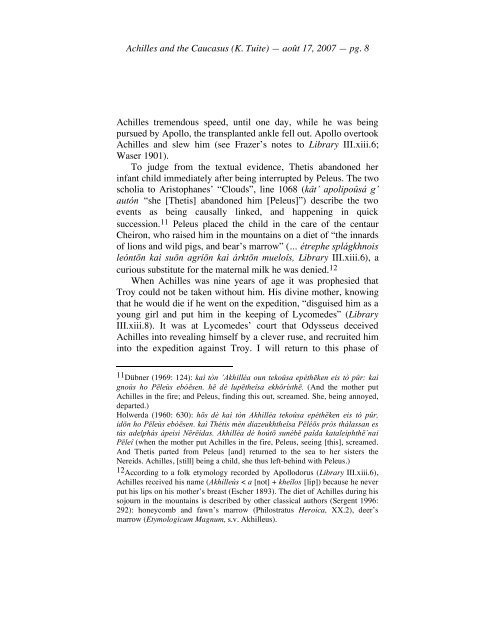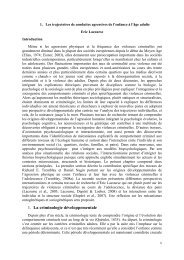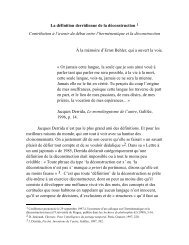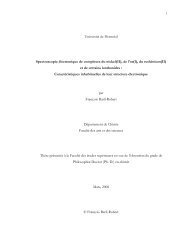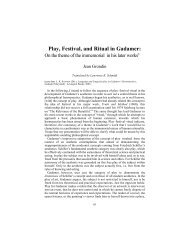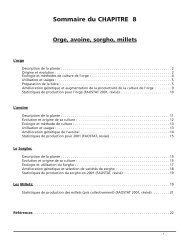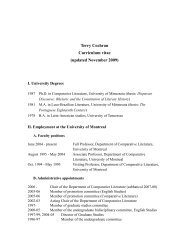Achilles and the Caucasus - Université de Montréal
Achilles and the Caucasus - Université de Montréal
Achilles and the Caucasus - Université de Montréal
You also want an ePaper? Increase the reach of your titles
YUMPU automatically turns print PDFs into web optimized ePapers that Google loves.
<strong>Achilles</strong> <strong>and</strong> <strong>the</strong> <strong>Caucasus</strong> (K. Tuite) — août 17, 2007 — pg. 8<br />
<strong>Achilles</strong> tremendous speed, until one day, while he was being<br />
pursued by Apollo, <strong>the</strong> transplanted ankle fell out. Apollo overtook<br />
<strong>Achilles</strong> <strong>and</strong> slew him (see Frazer’s notes to Library III.xiii.6;<br />
Waser 1901).<br />
To judge from <strong>the</strong> textual evi<strong>de</strong>nce, Thetis ab<strong>and</strong>oned her<br />
infant child immediately after being interrupted by Peleus. The two<br />
scholia to Aristophanes’ “Clouds”, line 1068 (kât’ apolipoûsá g’<br />
autón “she [Thetis] ab<strong>and</strong>oned him [Peleus]”) <strong>de</strong>scribe <strong>the</strong> two<br />
events as being causally linked, <strong>and</strong> happening in quick<br />
succession. 11 Peleus placed <strong>the</strong> child in <strong>the</strong> care of <strong>the</strong> centaur<br />
Cheiron, who raised him in <strong>the</strong> mountains on a diet of “<strong>the</strong> innards<br />
of lions <strong>and</strong> wild pigs, <strong>and</strong> bear’s marrow” (… étrephe splágkhnois<br />
leóntōn kaì suōn agríōn kaì árktōn mueloîs, Library III.xiii.6), a<br />
curious substitute for <strong>the</strong> maternal milk he was <strong>de</strong>nied. 12<br />
When <strong>Achilles</strong> was nine years of age it was prophesied that<br />
Troy could not be taken without him. His divine mo<strong>the</strong>r, knowing<br />
that he would die if he went on <strong>the</strong> expedition, “disguised him as a<br />
young girl <strong>and</strong> put him in <strong>the</strong> keeping of Lycome<strong>de</strong>s” (Library<br />
III.xiii.8). It was at Lycome<strong>de</strong>s’ court that Odysseus <strong>de</strong>ceived<br />
<strong>Achilles</strong> into revealing himself by a clever ruse, <strong>and</strong> recruited him<br />
into <strong>the</strong> expedition against Troy. I will return to this phase of<br />
11 Dübner (1969: 124): kaì tòn ’Akhilléa oun tekoûsa epéthēken eis tò pûr: kaì<br />
gnoùs ho Pēleùs ebóēsen. hē dè lupē<strong>the</strong>îsa ekhōrísthē. (And <strong>the</strong> mo<strong>the</strong>r put<br />
<strong>Achilles</strong> in <strong>the</strong> fire; <strong>and</strong> Peleus, finding this out, screamed. She, being annoyed,<br />
<strong>de</strong>parted.)<br />
Holwerda (1960: 630): hōs dè kaì tòn Akhilléa tekoûsa epéthēken eis tò pûr,<br />
idōn ho Pēleùs ebóēsen. kaì Thétis mèn diazeukh<strong>the</strong>îsa Pēléōs pròs thálassan es<br />
tàs a<strong>de</strong>lphàs ápeisi Nērēídas. Akhilléa dè hoútō sunébē paîda kataleiphthē`nai<br />
Pēleî (when <strong>the</strong> mo<strong>the</strong>r put <strong>Achilles</strong> in <strong>the</strong> fire, Peleus, seeing [this], screamed.<br />
And Thetis parted from Peleus [<strong>and</strong>] returned to <strong>the</strong> sea to her sisters <strong>the</strong><br />
Nereids. <strong>Achilles</strong>, [still] being a child, she thus left-behind with Peleus.)<br />
12 According to a folk etymology recor<strong>de</strong>d by Apollodorus (Library III.xiii.6),<br />
<strong>Achilles</strong> received his name (Akhilleús < a [not] + kheîlos [lip]) because he never<br />
put his lips on his mo<strong>the</strong>r’s breast (Escher 1893). The diet of <strong>Achilles</strong> during his<br />
sojourn in <strong>the</strong> mountains is <strong>de</strong>scribed by o<strong>the</strong>r classical authors (Sergent 1996:<br />
292): honeycomb <strong>and</strong> fawn’s marrow (Philostratus Heroica, XX.2), <strong>de</strong>er’s<br />
marrow (Etymologicum Magnum, s.v. Akhilleus).


